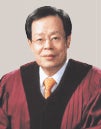Young-Joon Mok LL.M. ’89, a Justice of the Constitutional Court of Korea, spoke at Harvard Law School on “Constitutional Adjudication in the Republic of Korea,” on Tuesday, Sept. 11 at an event sponsored by East Asian Legal Studies, International Legal Studies and the Korea Institute.
In his talk, Mok discussed the advantages and disadvantages of a centralized system of constitutional adjudication, and described some of the Court’s major decisions, including cases on relocating the Korean capital to Seoul and on the prohibition of Internet use for political expression. During his visit, he also plans to meet with faculty and students.
When Mok arrived to study at Harvard Law School, he had already served for six years as a civil court judge in Incheon and Seoul. On his return to Korea, he went on to preside over other district and appeals courts and to serve as Chief of Staff to the Chief Justice of the Supreme Court. Mok has been a distinguished member of the Korean judiciary for almost 30 years. The high court on which he now sits as a Justice has only been in existence for 23 of them.
The Constitutional Court of Korea, established in 1988, was the first of its kind in Northeast Asia. It has been “a courageous and innovative court,” said Harvard Law School Professor William Alford, Vice Dean of the Graduate Program and International Legal Studies and director of East Asian Legal Studies, by playing an important role in Korea’s transition from an authoritarian state decades ago to a vibrant democracy today, and serving as a model for constitutional courts elsewhere.
Alford, who has known Mok for more than 20 years, said he isn’t surprised that this exemplary jurist serves on this exemplary court. Even before his appointment to the Constitutional Court, Mok was a respected voice on the role of a judge, traveling to and speaking in China and other countries. Since 2011, he has served as Korea’s representative to the Venice Commission, an advisory body on constitutional issues to the European Commission for Democracy through Law.
Mok has also found opportunities to pursue the interest in international commercial arbitration that brought him to Harvard. Since 2006, he has served as a Member of the Permanent Court of Arbitration at The Hague, and he is the author of two books and numerous articles on this subject.
“He is an incredibly astute and fair-minded jurist, with a wry sense of humor,” said Alford, noting that Mok’s appointment to the Constitutional Court in 2006 was supported by both major political parties in Korea — “a testament to Mok’s character and the trust in which he is held.”
Seung Wha Chang LL.M. ’92, S.J.D. 94, a professor of international trade law at Seoul National University and a recent appointee to the Appellate Body of the World Trade Organization, echoed those sentiments. “Justice Mok is simply versatile, not only as a judge, but as a human being. He reminds me of Justice Breyer as he is intellectually super-brilliant while being a master of judicial administration,” said Chang, who has returned to Harvard several times as a visiting professor.
For more information on this and other events at Harvard Law School, visit the HLS events calendar.
